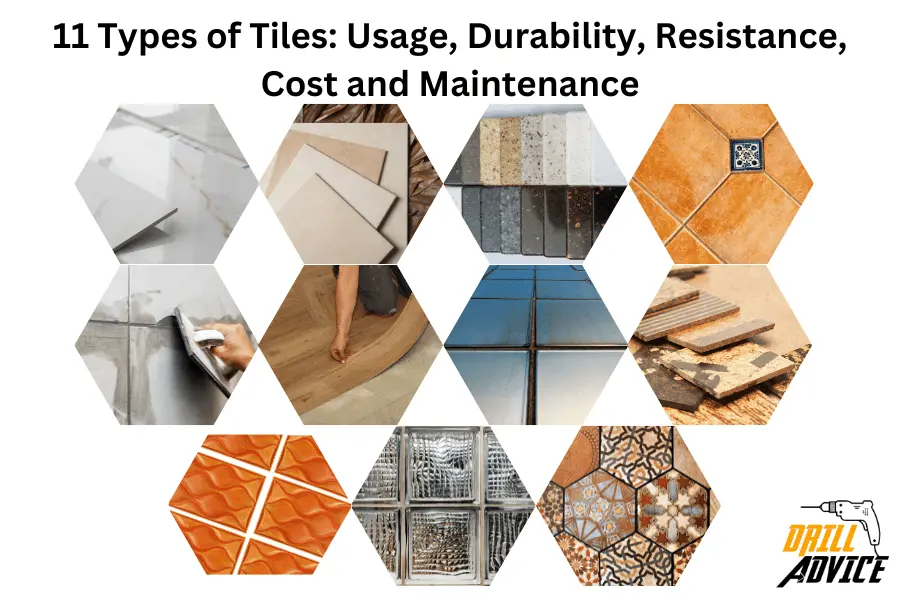
Tiles are hard and brittle material. Mainly 11 types of tiles are available such as porcelain, ceramic, natural stone, terracotta, cement, vinyl, metal, cork, leather, glass, and mosaic. Each of these types has 10 major different attributes such as usage, durability, water resistance, slip resistance, scratch resistance, size and shape, aesthetic appeal, installation, and maintenance.
The usage of the tile type is the palace of the tile laying. The tile should be selected according to the foot traffic, and environmental conditions mainly. The durability and scratch resistance mainly depends on the hardness of the tile. The water absorption rate of the tile should be minimum for water-related applications. In order to increase the slip resistance, you can use a textured surface tile. Different sizes and shapes of tiles are available in the market. Among them, you should choose a better aesthetic appeal and less maintenance and lower cost tile with easy installation.
Porcelain Tiles
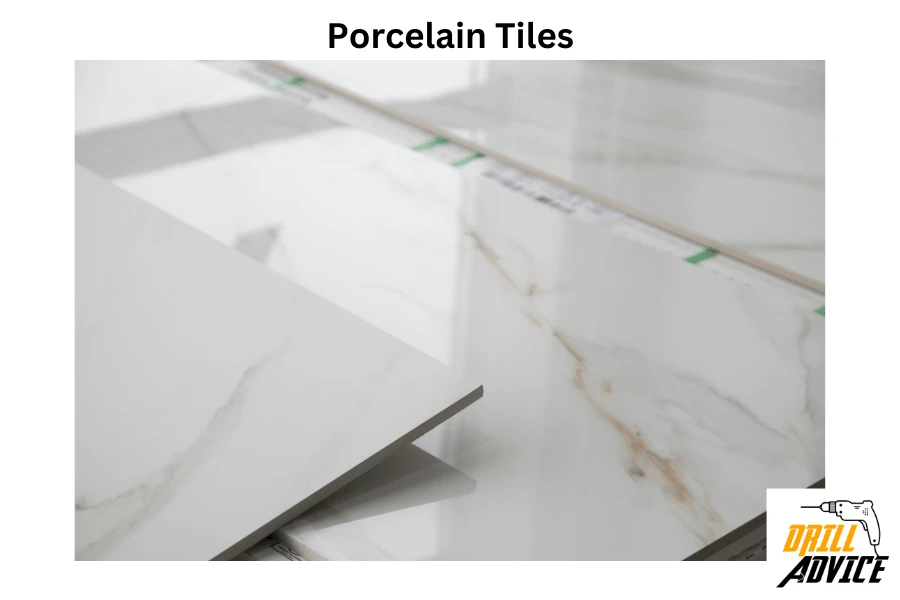
Porcelain tile is a type of ceramic tile crafted from a refined clay mixture. It is fired between 2381℉ – 2455℉(1305℃ – 1346℃) temperatures. This process increases its characteristic strength, density, and water resistance abilities.
Usage: Porcelain tiles have higher resilience and water resistance abilities. Therefore they are suitable for main 3 applications, such as floors, walls, and countertops in kitchens, bathrooms, hallways, and outdoor spaces.
Durability: Porcelain Tiles are highly durable because they are hard and dense. Therefore they are capable of withstanding high foot traffic area. Because of that, these tiles are suitable for both residential and commercial spaces.
Water Resistance: Porcelain Tiles are non-porous, higher dense with low water absorbency. They have less than a 0.5% water absorption rate, according to ASTM C373. Therefore, porcelain tiles have a high water resistance ability. Because of that, porcelain tiles are most suitable for damp areas, such as bathrooms or exterior installations.
Slip Resistance: Many Porcelain tiles have a textured surface that provides increased slip resistance. When you use porcelain tiles for wet areas, it is good to select tiles with >.60 of DCOF rating and for dry areas a DCOF rating >.42, and it reduces the risk of slips and falls.
Scratch Resistance: Porcelain tiles are hard and it makes them highly scratch resistant. According to Mohs Hardness Scale glazed porcelain tiles have a 7 hardness value, and unglazed porcelain tiles would receive a hardness value of 8. Therefore glazed porcelain tiles get easily scratched than unglazed porcelain tiles.
Size and Shape: You will find Porcelain tiles in countless shapes and sizes, from small mosaics to large-format tiles. This diversity allows for plenty of design possibilities.
Aesthetic Appeal: The design potential with Porcelain Tiles is virtually unlimited because they have variety of colors, textures, sizes, and finishes.
Maintenance: Porcelain Tiles require minimal maintenance. Regular sweeping, occasional mopping with a non-abrasive cleaner and prompt stain removal can keep them in perfect condition for years.
Cost: The cost of Porcelain Tiles can be higher than some other tile types due to their high durability and aesthetic qualities. The porcelain tile longevity often makes them a cost-effective solution over time.
Installation Method: Porcelain Tiles can be installed using a specific porcelain tile mortar. The complexity of installation might require professional help, but with patience and precision, skilled DIYers can undertake this task.
Read More About – How to Drill Tile: Porcelain and Ceramic
Ceramic Tiles
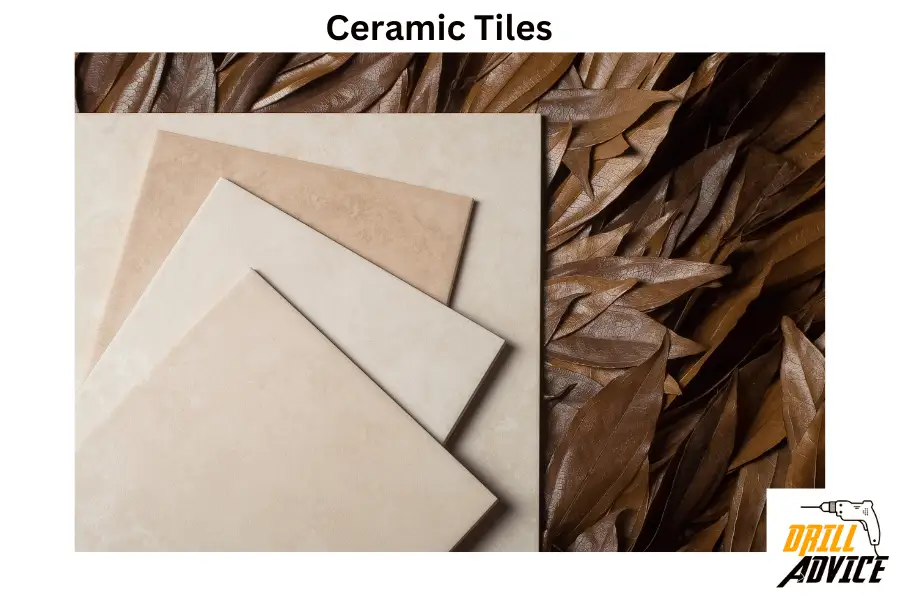
Ceramic tiles are a type of tile made primarily from clay. Ceramic tiles are shaped and then fired in a kiln at very hot temperatures ranging between 1000°C – 1250°C (1832° – 2282° F). This process gives these tiles their strength and water-resistant properties. Often, they’re coated with a glaze to enhancing their durability and appearance.
Usage: With their versatility, Ceramic Tiles can be used in various settings like floors, walls, backsplashes, or outdoors. They’re suitable for any room in the home, from bathrooms and kitchens to living areas and bedrooms.
Durability: Although ceramic tiles have least dense than porcelain tiles, Ceramic Tiles can withstand heavy foot traffic. Therefore these tiles are a good choice for residential spaces. They resist wear and tear and can last for decades if maintained properly.
Water Resistance: Ceramic tiles have the least dense. Therefore they have a water absorption rate of over 10%, according to ASTM C373. However, glazed Ceramic Tiles have good water resistance ability than unglazed, therefore, glazed Ceramic tiles are often used in bathrooms and kitchens. Especially the grout lines between the tiles need to be sealed to prevent water penetration.
Slip Resistance: Certain ceramic tiles are designed with a textured surface to increase slip resistance, an essential factor to consider in wet environments like bathrooms.
Scratch Resistance: Ceramic tiles offer high scratch resistance. They can withstand everyday wear and tear without losing their luster.
Size and Shape: Ceramic tiles come in a wide variety of shapes and sizes. From small mosaic pieces to large-format tiles, the possibilities for design are limitless.
Aesthetic Appeal: The aesthetic appeal of ceramic tiles lies in their variety. They come in numerous colors, patterns, and finishes, offering the freedom to create unique designs that suit individual styles and preferences.
Maintenance: Maintenance is relatively simple for ceramic tiles. Regular sweeping or vacuuming and occasional mopping with a mild detergent will keep them looking fresh and new.
Cost: Compared to other tiling options, ceramic tiles offer a cost-effective solution. The price varies depending on the style and quality, but overall, they offer a good balance of cost and durability.
Installation Method: Ceramic tiles can be installed using a thin-set adhesive. The tiles and grout should be sealed afterward to maintain their longevity. While many homeowners choose to DIY, professional installation can ensure the best results.
Natural Stone Tiles
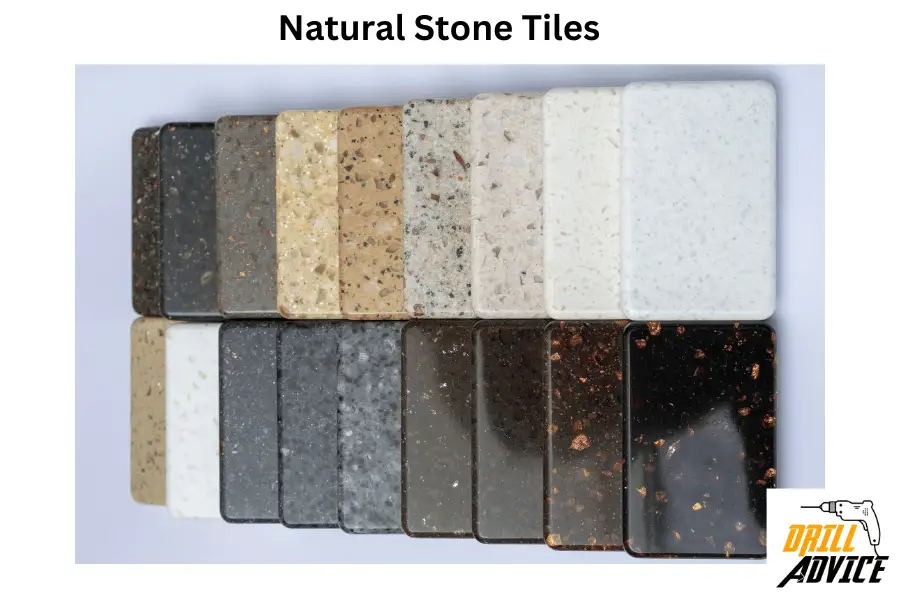
Natural Stone Tiles are derived from nature itself, cut and shaped from materials like marble, granite, limestone, and slate. The resulting tiles bring a piece of the earth’s unique geology into your home.
Usage: Stone tiles have versatility ability. They can be used well to various spaces such as grandiose entryways, rustic kitchens, luxury bathrooms, or cozy fireplaces. Their robust nature makes them suitable for both indoor and outdoor use.
Durability: Natural Stone Tiles are renowned for their durability. Formed over thousands of years, these tiles withstand wear and tear effectively. They have longevity that’s hard to match with other materials.
Water Resistance: Certain types of stone, like granite and slate, demonstrate high water resistance, making them suitable for environments prone to moisture, such as bathrooms and kitchens.
Slip Resistance: Stone tiles, particularly those with textured surfaces, provide good slip resistance, ensuring safety along with their aesthetic appeal.
Scratch Resistance: The inherent strength of natural stone gives it excellent resistance to scratches. While softer stones like marble may need more careful treatment, harder stones like granite are highly scratch-resistant.
Size and Shape: The beauty of natural stone tiles depends on their versatility of sizes and shapes. From large rectangular slabs for a minimalist look to tiny hexagonal pieces for a complex mosaic, the possibilities are endless.
Aesthetic Appeal: Natural Stone Tiles offer a high aesthetic appeal. The unique patterns and tones of each stone type can enhance the visual appeal of any space. That makes every tile installation unique.
Maintenance: Despite their rugged appearance, Natural Stone Tiles do require some maintenance. Regular cleaning and periodic sealing can keep them in top shape, preserving their natural beauty for years to come.
Cost: While Natural Stone Tiles can be more costly than their man-made counterparts, the investment often pays off in terms of durability, aesthetics, and increased property value.
Installation Method: Installation of Natural Stone Tiles requires precision and a certain level of expertise. Proper installation ensures the longevity of the tiles and maximizes their aesthetic potential.
Terracotta Tiles
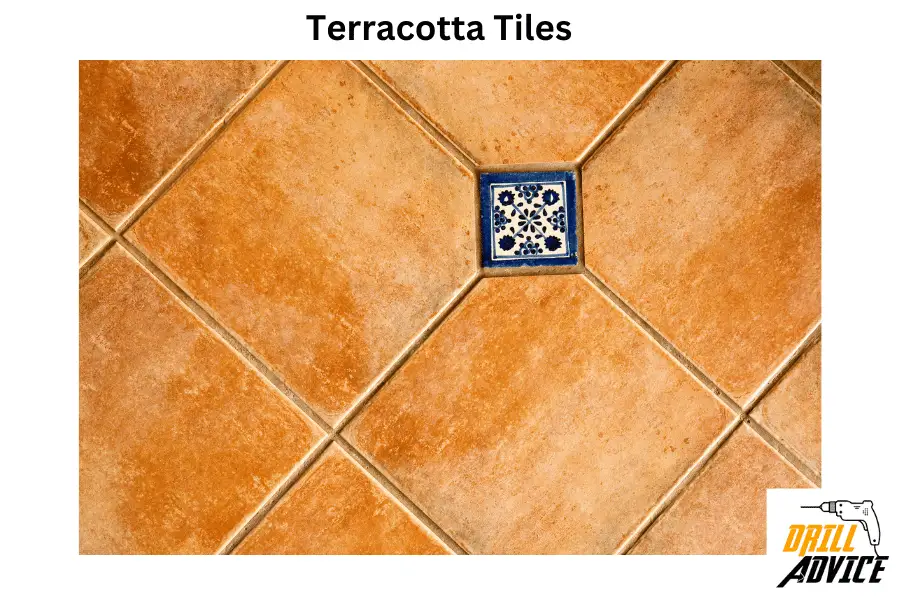
Terracotta Tiles are ceramic tiles crafted from clay. Their name is derived from the Italian words ‘terra cotta’ which means ‘baked earth,’ reflecting their earthy hues and natural origins. They are fired at a lower temperature than porcelain or stone tiles, which lends them their unique color and texture.
Usage: Terracotta Tiles are versatile and can be used in various spaces due to their earthy aesthetic and warm hues. They can be used in kitchens, bathrooms, outdoor patios, and in regions with hot climates due to their cool touch.
Durability: One of the main appeals of Terracotta Tiles is their durability. They are robust and can withstand high-traffic areas in homes without showing signs of wear and tear.
Water Resistance: Though Terracotta Tiles aren’t naturally water-resistant, a quality sealant can increase their resistance significantly. This makes them suitable for areas prone to moisture, such as kitchens or bathrooms.
Slip Resistance: With a naturally textured surface, Terracotta Tiles offer excellent slip resistance, an attribute that is especially useful for outdoor areas or wet zones in the home.
Scratch Resistance: Terracotta Tiles have a fair resistance to scratches. While they might not be as resistant as harder materials like granite, they can still withstand daily use without significant damage.
Size and Shape: Terracotta Tiles are available in a wide range of sizes and shapes, from small mosaics to large square or rectangular tiles, allowing for a variety of design options.
Aesthetic Appeal: Terracotta Tiles are renowned for their rustic, natural beauty. Their warm, earthy tones and slightly irregular shapes add charm and character to any space.
Maintenance: These tiles require a bit of maintenance to keep them looking their best. Regular cleaning with non-acidic products and periodic resealing will keep them in excellent condition.
Cost: Terracotta Tiles are a cost-effective choice compared to other natural stone tiles. Their pricing depends on factors like quality, origin, and size.
Installation Method: Like most tiles, Terracotta Tiles require a clean, level surface for installation. A good quality adhesive and grout are key for a durable installation.
Cement Tiles
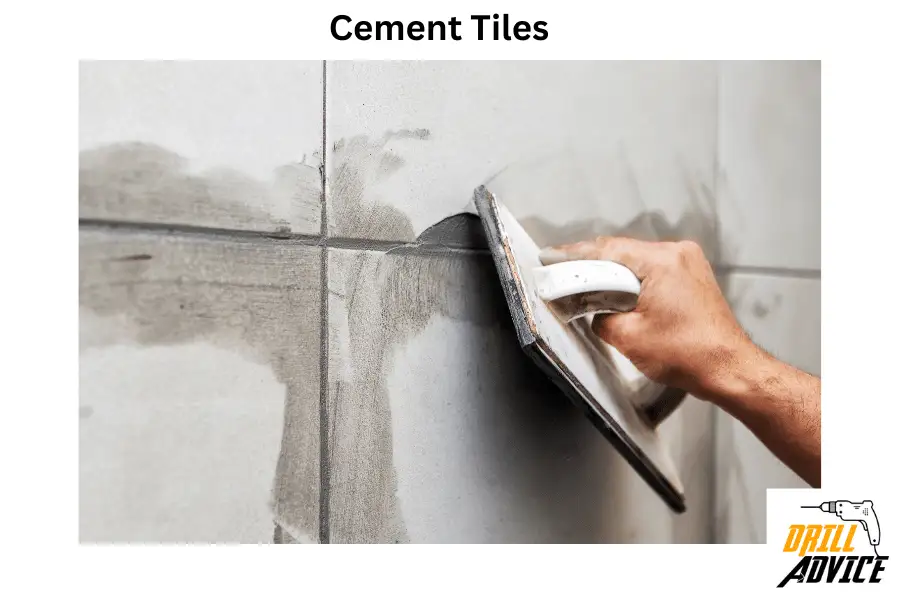
Cement Tiles are a blend of natural materials but are primarily made from cement. The combination of cement, sand, and mineral pigments results in a tile that is dense, sturdy, and full of character.
Usage: Cement Tiles have versatile nature. Therefore they can be used in various spaces like kitchens, bathrooms, and outdoor areas. Their ability to be customized makes them perfect for creating unique designs in homes.
Durability: Cement Tiles are highly durable, making them a choice for high-traffic areas. Their solid build ensures they can withstand wear and tear for years, ensuring lasting elegance.
Water Resistance: Cement Tiles are not naturally water-resistant. However, when sealed properly, they can resist moisture effectively, making them suitable for damp areas.
Slip Resistance: Due to their textured surface, Cement Tiles are naturally slip-resistant, offering safety along with aesthetic appeal.
Scratch Resistance: One of the advantages of Cement Tiles is their high resistance to scratches. This robust nature allows them to retain their charm, despite heavy use.
Size and Shape: Because of versatility nature of Cement Tiles have many shapes and sizes. They can be made from square to hexagonal shapes.
Aesthetic Appeal: Cement Tiles are revered for their ability to offer a mix of traditional and contemporary aesthetics. Their patterns and colors can be tailored, allowing them to complement a wide range of design styles.
Maintenance: Like any tile, Cement Tiles require maintenance. Regular cleaning using pH-neutral cleaners, along with periodic sealing, ensures their longevity and beauty.
Cost: The cost of Cement Tiles can vary based on the design and quality. They may be more expensive than other tiles, but their longevity and unique design capabilities often justify the investment.
Installation Method: Installation of Cement Tiles involves a clean, flat surface, quality adhesive, and grout. A properly installed cement tile can last for decades, offering a fantastic return on investment.
Vinyl Tiles
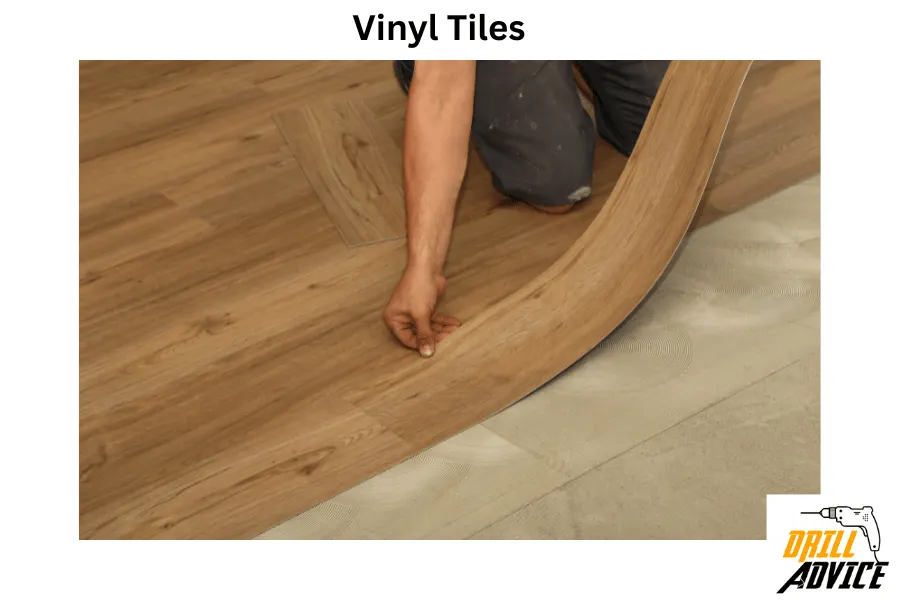
Vinyl Tiles are made from a synthetic material called polyvinyl chloride (PVC), which is combined with other elements to provide texture and color. This manufacturing process results in a tile that’s not only versatile but also very practical.
Usage: Vinyl Tiles are incredibly adaptable, often used in kitchens, bathrooms, and living areas due to their resilience and variety of designs. They are ideal for high-traffic areas and can adapt to various styles, fitting perfectly into any decorative scheme.
Durability: One of the main advantages of Vinyl Tiles is their impressive durability. Their strong composition withstands heavy footfall, ensuring that they retain their appeal over time.
Water Resistance: Vinyl Tiles are naturally water-resistant, making them a perfect fit for rooms exposed to moisture, such as bathrooms or kitchens.
Slip Resistance: Depending upon the finish, Vinyl Tiles can offer good slip resistance, ensuring safety in areas prone to wetness.
Scratch Resistance: Another benefit of Vinyl Tiles is their resistance to scratches, allowing them to maintain their aesthetic appeal even after extensive use.
Size and Shape: The versatility of Vinyl Tiles is also displayed in the wide range of sizes and shapes they are available in. From small squares to larger planks.
Aesthetic Appeal:Vinyl Tiles can mimic various materials, including wood, stone, and ceramic, offering significant aesthetic appeal. The vast array of designs, colors, and textures available.
Maintenance: Vinyl Tiles are incredibly easy to maintain. Routine sweeping and occasional mopping with a mild cleaner are enough to keep them in prime condition.
Cost: In terms of cost, Vinyl Tiles are an economical option. Their affordability, coupled with their durability, offers an excellent value proposition for homeowners on a budget.
Installation Method: Vinyl Tiles can be installed easily, often featuring a self-adhesive backing, which is perfect for DIY enthusiasts. A professional installation is also an option, but the simplicity of the process means many choose to do it themselves.
Metal Tiles
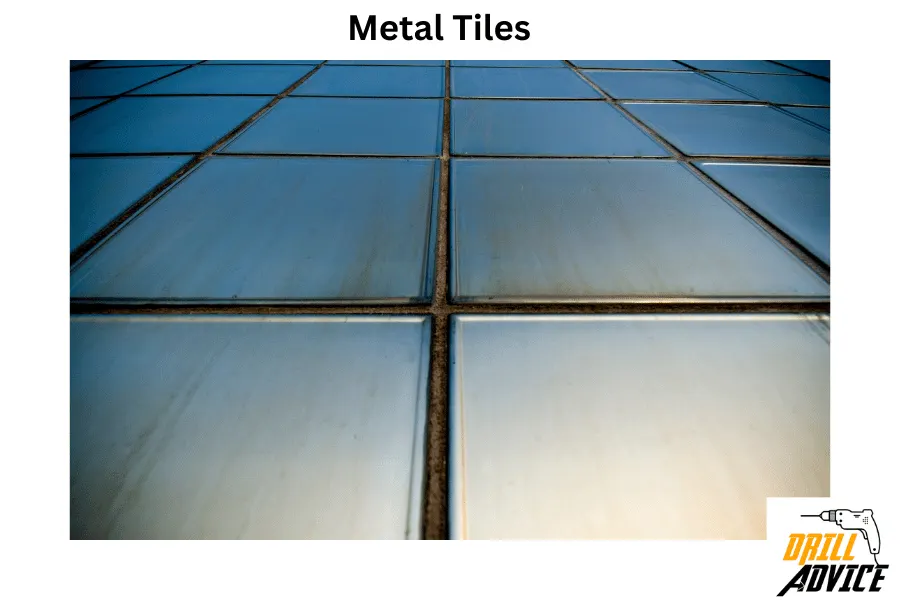
Metal Tiles are made from a variety of metals, including stainless steel, copper, and aluminum. These materials undergo a manufacturing process that molds them into sturdy, attractive tiles suitable for various settings.
Usage: Metal Tiles can be used in several areas around the home such as in kitchens and bathrooms. They add a sleek, modern touch to backsplashes, walls, and even floors. Their high shine and unique look make them a bold design choice.
Durability: Metal Tiles are known for their remarkable durability. Their strong nature remains for a long time.but that depends on both physical impact and environmental factors.
Water Resistance: The metals naturally have water resistance ability. Therefore metal tiles are an excellent choice for areas prone to moisture, such as showers and sinks. They won’t warp or deteriorate due to water exposure.
Slip Resistance: Metal Tiles, depending on their texture, can offer significant slip resistance, a critical safety feature for floor applications.
Scratch Resistance: Metal Tiles are highly resistant to scratches, maintaining their sleek and shiny appearance even under heavy use.
Size and Shape: The flexibility of metal allows these tiles to be produced in a wide variety of sizes and shapes. From small mosaic tiles to larger, rectangular pieces. They can be made as a style to fit any design scheme.
Aesthetic Appeal: The unique luster of Metal Tiles lends an unparalleled aesthetic appeal. Their gleaming surfaces capture light and can make a room appear larger.
Maintenance: Maintaining Metal Tiles involves regular dusting and cleaning with appropriate cleaners. Their smooth surfaces make cleaning simple, ensuring they continue to shine over the years.
Cost: While Metal Tiles can be more expensive than their ceramic or vinyl counterparts, their durability and the unique aesthetic they provide often justify the cost.
Installation Method: Installation of Metal Tiles involves adhesive and grout, much like traditional tiles. Although DIY installation is possible, professional installation may be preferable to ensure the tiles are correctly sealed and fitted.
Cork Tiles
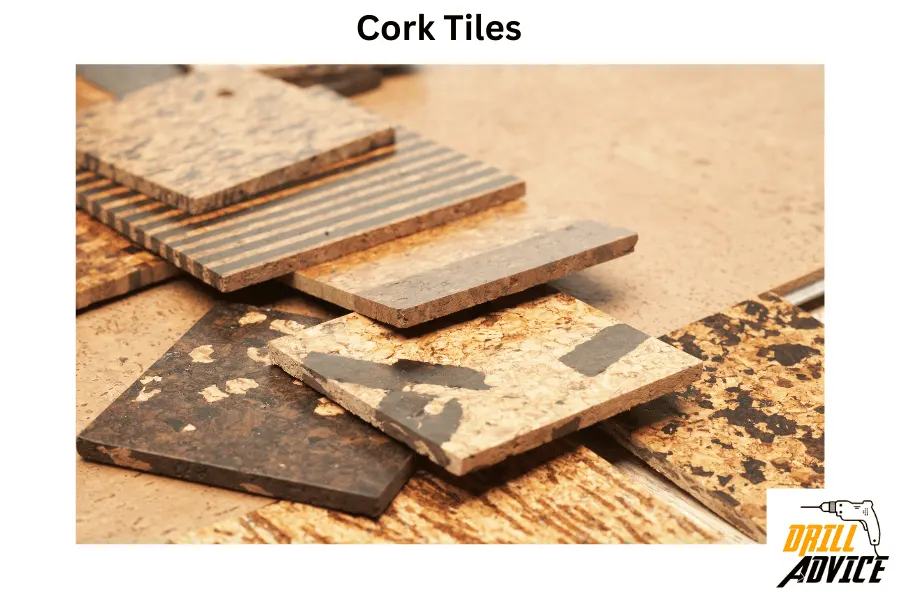
Cork Tiles are manufactured from the bark of the cork oak tree. Harvesting this material doesn’t harm the tree, making it an incredibly sustainable choice. These tiles offer warmth and a natural aesthetic that few other materials can match.
Usage: Cork Tiles are wonderfully versatile. They’re suitable for various home areas, including living rooms, kitchens, and bedrooms, due to their natural insulation properties and unique look.
Durability: Cork Tiles are highly durable. Their cellular structure allows them to bounce back from impact. That helps to maintain their form over time.
Water Resistance: Cork tiles are naturally water-resistant. However, it’s essential to seal Cork Tiles properly after installation to prevent water damage, especially in wet areas like the bathroom or kitchen.
Slip Resistance: The soft, textured surface of Cork Tiles provides excellent slip resistance, an advantage in rooms where spills may occur, such as kitchens and bathrooms.
Scratch Resistance: While Cork Tiles can use as daily wear, they’re not as scratch-resistant as harder materials. However, small scratches can often blend into the natural pattern of the cork.
Size and Shape: Available in various sizes and shapes, from traditional square tiles to intricate mosaics, Cork Tiles offer design flexibility to suit your style and space.
Aesthetic Appeal: With their natural tones and unique texture, Cork Tiles add a warm, organic touch to any room. They can complement a range of decor styles, from rustic to modern.
Maintenance: Cork Tiles require periodic sealing to maintain their water resistance and overall appearance. Regular sweeping and damp mopping will help keep them looking their best.
Cost: While Cork Tiles are generally more affordable than natural stone, they are slightly more expensive than some other tile options. However, their unique benefits often make them worth the investment.
Installation Method: The installation of Cork Tiles can be a DIY project, with tiles generally featuring a self-adhesive backing. However, professional installation might be preferable for large spaces or complex patterns.
Leather Tiles
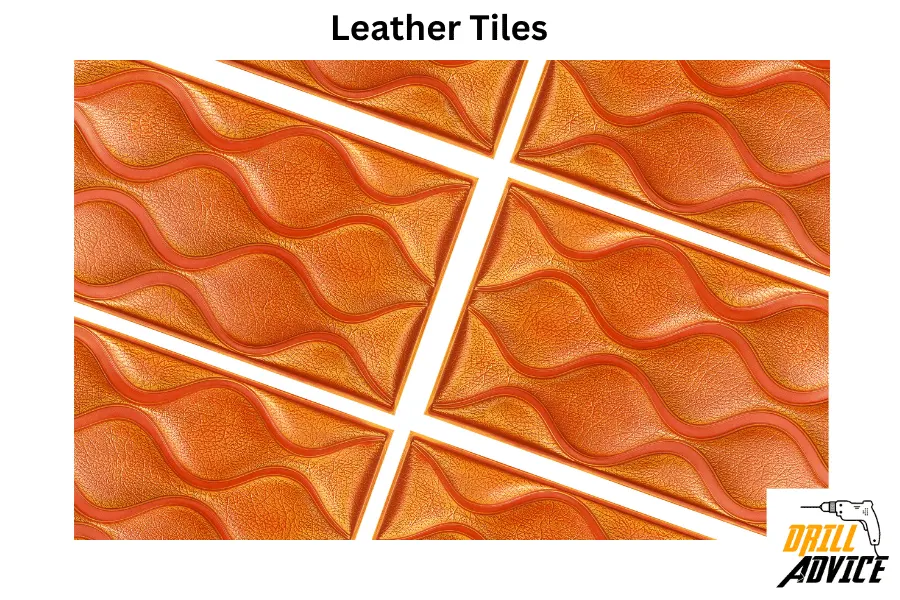
Leather Tiles are crafted from genuine or faux leather. They bring a sense of luxury and sophistication that is difficult to replicate with other materials, truly showcasing the innovative use of natural resources in interior design.
Usage: These versatile tiles can be used on floors, walls, or ceilings. Particularly popular used in living rooms, home offices, or high-end retail spaces.
Durability: While not as hardy as stone or ceramic tiles, Leather Tiles have better durability. When properly maintained, these tiles can last for years.
Water Resistance: Leather Tiles are not inherently water-resistant, but they can be treated to repel water. However, they may not be the best choice for areas prone to high moisture, like bathrooms or kitchens.
Slip Resistance: Leather Tiles have a natural grip, making them a safer choice in terms of slip resistance, especially when compared to polished stone or ceramic tiles.
Scratch Resistance: Leather Tiles can scratch, but similar to leather furniture, these marks often blend into the overall look of the tile, enhancing its character rather than diminishing its appearance.
Size and Shape: Leather Tiles come in a variety of shapes and sizes, providing opportunities for custom designs. They offer flexibility to create an interior that matches your style and personality.
Aesthetic Appeal: With their rich, tactile surface, Leather Tiles add a touch of luxury and warmth. The natural variations in the leather bring a unique character to every tile.
Maintenance: Maintenance for Leather Tiles involves regular dusting and occasional treatment with a leather conditioner to keep them looking their best. Proper care can extend their lifespan considerably.
Cost: As you might expect, Leather Tiles come with a higher price tag compared to more traditional tile materials. However, the investment can be worth it for the unique aesthetic and feel they bring to a space.
Installation Method: Leather Tiles can be glued directly onto a clean, dry surface. However, professional installation is often recommended to ensure the best results and longevity of the material.
Glass Tiles
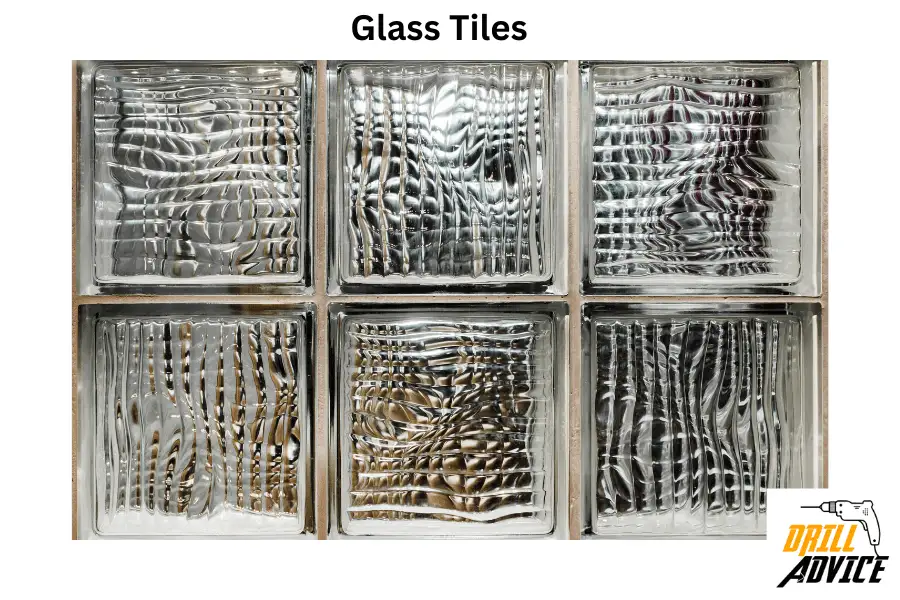
Glass tiles carve a distinct niche in the realm of DIYs and home improvements. Their unique attributes make them a standout choice for many homeowners.
Usage: Glass tiles have a versatile ability. Therefore these tiles are good for kitchens and bathrooms, and as feature walls and in windows details.
Durability: Although glass tiles’ surfaces may appear delicate, they have high durability. Because of their hardness,
Water Resistance: Glass tiles are non-permeable. Because glass tiles are very hard and it makes these tiles highly water resistant.
Slip Resistance: Glass tiles do not have salves slip-resistant ability. But glass tiles can be made safer with appropriate treatments, ensuring they meet the needs of different spaces.
Scratch Resistance: Glass tiles resist scratching effectively, keeping their pristine appearance intact despite routine impacts.
Size and Shape: Available in a variety of sizes and shapes, glass tiles cater to diverse design requirements, fostering creativity in home renovation projects.
Aesthetic Appeal: Glass tiles possess an unmatched aesthetic allure. Their reflective qualities can amplify light and color, transforming any space they adorn.
Maintenance: These tiles require minimal maintenance. Regular cleaning is generally sufficient to maintain their gleam and charm.
Cost: Glass tiles tend to be more expensive than other types, but their aesthetic and functional benefits often justify the investment.
Installation Method: Installing glass tiles requires precision and a gentle hand. Nevertheless, the end result is a visually stunning surface that elevates your home’s aesthetic and functional appeal.
Mosaic Tiles
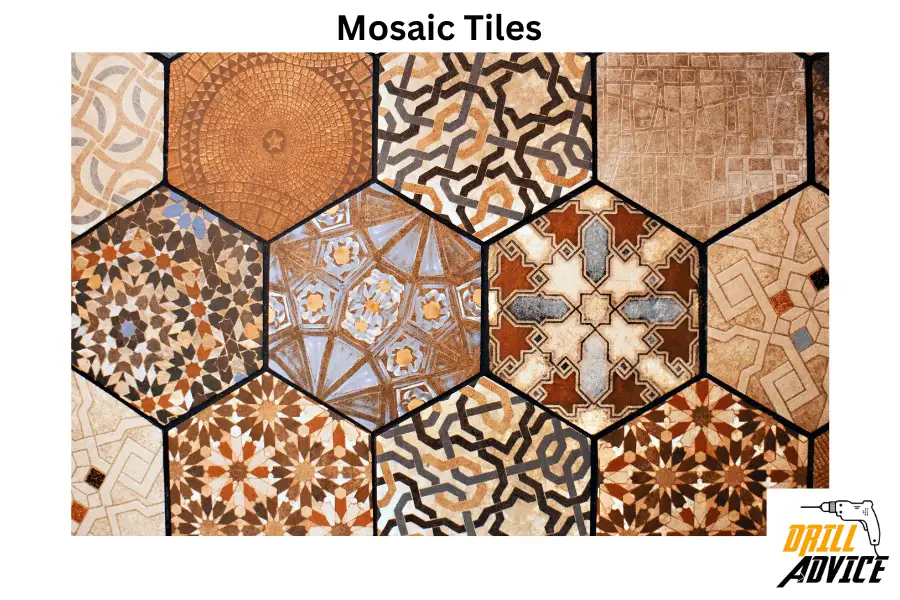
Usage: Mosaic tiles are versatile. These tiles are suitable for bathroom floors, kitchen backsplashes, and intricate feature walls,
Durability: mosaic tiles are built to last. These durable tiles resist wear and tear. That ensures the mosaic tiles’ longevity.
Water Resistance: mosaic tiles water resistance is high, therefore, they are perfectly suited for moist environments such as bathrooms and kitchens. Tey provide resilience along with aesthetics.
Slip Resistance: Certain varieties of mosaic tiles offer slip resistance, an essential attribute for safety in wet areas like bathrooms and pool decks.
Scratch Resistance: Despite their intricate designs, mosaic tiles hold up well against scratches, retaining their beauty over time.
Size and Shape: Mosaic tiles come in various kind of sizes and shapes. These tiles offer limitless possibilities for custom patterns and unique design concepts.
Aesthetic Appeal: mosaic tiles have eye-catching designs and vibrant colors. These tiles have the ability to transform any ordinary space into a visual delight.
Maintenance: Regular cleaning is all it takes to keep mosaic tiles looking their best. Their low maintenance demands make them an attractive option for busy homeowners.
Cost: While mosaic tiles can be pricier than their plain counterparts, the stunning visual impact they deliver justifies the investment for many.
Installation Method: Installing mosaic tiles requires precision, given their small size and often complex patterns. However, the outcome is a breathtaking mosaic that adds an unmatched charm to any room.
Is Drilling Tile Harder Than Concrete?
Yes, drilling tile is typically harder than concrete. This is because tiles are often made from materials like porcelain or ceramic which are harder than concrete. Additionally, tiles are also more fragile and prone to cracking or shattering if not drilled correctly. On the other hand, concrete is a composite material that is relatively easier to drill into, though it does require a specific type of drill bit to do so without causing damage.
